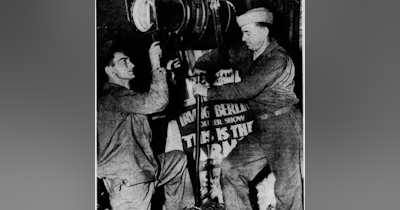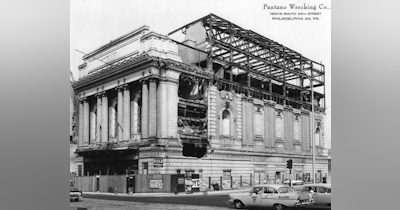Above, photo from a promotional brochure of the Theatre of the Living Arts, dating from Fall 1966. Caption: "Pointing the way to good theatre are Southwark Theatre Company campaigners (left to right) Deborah Sussel of Merion, who plays a role in the comedy, Room Service; Charlotte Rea of Texas, the property girl; and, in the driver's seat of the 'election' truck, designed to bring the message of exciting theatre to the people of Philadelphia, is a Philadelphian, Carolyn Hawkins, the Theatre's bookkeeper."
Below left, a photo from the Philadelphia Inquirer, September 11, 1966: "Gertrude Jeanette tries to comfort Lois Smith in a scene from William Carlos Williams' Dream of Love, which opens at the Theatre of Living Arts on Tuesday."
Despite the performances of these two excellent actresses (and even though the text contained a lot of William Carlos Williams' widely admired poetry), Dream of Love was the worst performing production - in terms of box office - of TLA's third season. It was rarely mentioned in any subsequent promotional material.
However, the October/November TLA production of Room Service (below right) garnered delirious reviews from local critics, and broke all box office records for the TLA up to that point.
Above, a banner newspaper ad from the Fall 1966 marketing campaign - in a format similar to the sound truck photo seen at the top of this post. (Though it was not a presidential election year, there were mid-term Congressional elections taking place in November of 1966, and the race for Governor of Pennsylvania between the Democrat Milton Shapp and the eventual winner, Republican Raymond Shafer, was heating up the newspapers and airwaves of the day.)
We can also note from this ad that the fourth production of the TLA season was originally slated to be Lorenzo, by Jack Richardson. A take on bloody Renaissance Era dramas, Lorenzo was clearly meant to be seen in the context of the ongoing war in Vietnam. However, when the similarly edgy Beclch was failing badly to attract ticket sales, it was canceled as too risky . Instead, William Saroyan's The Time of Your Life was moved up in the TLA season schedule, and Robert Lowell's translation of Racine's Phaedre, starring the actress Diana Sands, was moved to the end of the season.
But by that point André Gregory had already departed, and former Associate Artistic Director George Sherman had returned as Interim Artistic Director. John Bos, the former director of publicity, was tapped to be Managing Director. The TLA ship was righted for a while, but the major damage that had been done to the theater's reputation, from which it never entirely recovered. Although the production of The Time of Your Life was well attended, and Diana Sands' performance in Phaedre was highly praised, subscriptions plummeted and Philadelphia audiences never really returned to the TLA in the same numbers as previously. Below, a document from the Historical Society of Pennsylvania's archives of the TLA, showing how the first five seasons of the company compared to each other. By '68-'69, only the PCPA's booking of outside shows and attractions managed to keep , and the regular season shows drew less than 60 percent of capacity.
Above, actress Sharon Gans, during rehearsals for Beclch at the Theatre of the Living Arts in November of 1966, along with members of the Arthur Hall Dance Ensemble. The photo was taken by Betty Nettis Bennett and is in the Theater Collection of the Free Library of Philadelphia. Below, a page from the text of the play itself, which I believe corresponds to the action of the play in the moment the photo was taken.
A January 1967 newspaper ad for Beclch, utilizing the broad range of published critical opinion of the show. Evidently the TLA hoped to capitalize on the public curiosity about all the attention Beclch had received, and publicists pulled quotes from both positive and negative reviews. "An evening of sensual theatre," said the New Haven Register. "Bizarre" said the Evening Bulletin. "Sick," said a reviewer for a Catholic publication.
Below, the February 20, 1967 story in Philadelphia Daily News detailing their version of the events of the week when André Gregory was finally fired from the TLA. By that point, Managing Director David Lunney had already departed.
Finally, more Beclch rehearsal photos by Betty Nettis Bennett, showing actor Jerry Dempsey as the elephantiasis-riddled King "Yago" and actor James John Little as "Jose". Jose is deriding Yago as "King Fat Leg" and demanding a piece of bread so he can "dip it in my vodka."
In the background dancers form a throne for Queen Beclch with their bodies. In his memoirs, André Gregory would cite this as an important development of his own artistic growth. It would influence his later explorations of the human body to create physical realities. This approach would be further developed when he worked on Alice In Wonderland with the Manhattan Project in the 1970s.
Above, a Betty Nettis Bennett photo of Arthur Hall, the leader of the dance company, wearing a grass headdress during the rehearsals of Beclch.
I'm sorry that I can't be more exact about the precise identities of the other members of the Afro-American Dance Ensemble we see in these photos. But in the published program for Beclch their names were listed as: Vangie Brown, Carol Butcher, George Cannon, Richard Moten, John Amez Blaine, Robert Crowder and Karen Steptoe.
Additional images of Beclch from the archives can be found on our Patreon page! If you would like to see them, please consider becoming a supporting patron of the podcast: https://www.patreon.com/AITHpodcast
POSTSCRIPT:
John Bos eventually took over leadership of the Theatre of the Living Arts, and kept it going for two more full seasons - though its audience numbers never returned to previous levels. In its final shortened season of '69-'70, the TLA mounted a production of George Farquhar's 18th Century classic comedy The Recruiting Officer, followed by Harold Ribman's 1965 drama Harry, Noon and Night.
The big project of the season, however, was The Line of Least Existence, scheduled for January of 1970. This was an ambitious rock opera with a book by painter, novelist and playwright Rosalyn Drexler, with music by 21 year-old John Hall. Judd Hirsch headed up the large cast, playing a "lunatic doctor" - along with Danny DeVito, who played his dog. Director John Bissinger helmed the project, for which he had received a $22,000 grant from the National Endowment of the Arts.
Like other avant-garde rock 'n roll shows of that era, Line of Least Existence had a loose plot structure. In fact, if it showed ambitions to be “the Next Hair,” that was not a coincidence. Like Hair, Least Existence had in fact once been optioned and abandoned by the Public Theater’s Joe Papp, and now was being staged in hopes of repeating that famous rock musical's success. Like Hair, hinted the pre-show publicity by the TLA, there might be on-stage nudity. (Though this did not turn out to be the case, there was a large inflatable phallus sprouting onstage at the climax of Act II.)
The plot, such as it was, centered on the story of a Hungarian refugee trying to find his lost daughter. The stage of the TLA was covered with Eugene Lee's set, which included lighted boxes, a catwalk, projection screens, a psychiatrist's couch, a doghouse, and a ramp extending into the house on which the rock band musicians were seated. It was very reminiscent, in fact, of Lee’s previous work (along with John Conklin) on the set of Beclch, which had also attempted to radically transform the TLA’s thrust stage and traditional rows of audience seating.
It was, by all accounts, an ambitious mess, and met with little favor from audiences or the Living Arts' board. Soon after The Line of Least Existence closed, the entire theater company followed suit. Despite its promising beginnings, it was not destined to be the leading non-profit theater in the city of Philadelphia, after all.
Selected Bibliography:
Books
Gregory, Andre and Todd London, This Is Not My Memoir, Farrar, Strauss & Giroux, 2020.
London, Todd, An Ideal Theater: Founding Visions for a New American Art, Theatre Communications Group, 2013, pp. 355-358.
Novick, Julius, Beyond Broadway: The Quest for Permanent Theatres (Dramabook Edition), Hill and Wang, 1969.
Owens, Rochelle. Beclch. Alexandria, VA: Alexander Street Press, 2004. Internet resource.
Newspaper and Magazine Articles (in chronological order)
"Williams' 'Dream of Love' Ushers in Season," by Henry Murdock, Philadelphia Inquirer, September 14, 1966.
"Suit Seeks to Force Transfer of Title to Theater Building," Philadelphia Evening Bulletin, October 11, 1966.
"Theater Sues Founder To Force Building Sale," Philadelphia Inquirer, October 12, 1966.
"'Room Service' Recalls Cornball 30s," by Stephen R. Allen, Camden Courier-Post, November 2, 1966, p. 35.
"'Room Service' at the Living Arts," by Jerry Gaghan, Philadelphia Daily News, November 2, 1966, p. 39.
"'Beclch' Bows at the Living Arts," Philadelphia Inquirer, December 18, 1966, pp. 109, 113.
"Controversial 'Beclch' Opens," Philadelphia Evening Bulletin, December 18, 1966.
"'Beclch' Excites, Shocks," by Stephen R. Allen, Camden Courier-Post, December 22, 1966, p. 29.
"'Beclch' Bombs Badly," Asbury Park Press, December 23, 1966, p. 23.
"Play on Deadly Female Killed By Too Many Axes," by Otto Dekom, Wilmington Morning News, December 29, 1966, p. 23.
"Beclch," by Marvin Gottfried, Women's Wear Daily, Vol 114, Issue 2, January 4, 1967, p. 4.
"Beclch", Variety, January 7, 1967.
"Afro-American Ensemble In Another Dance Triumph," by Mark Bricklin, Philadelphia Tribune, January 21, 1967.
"Theater: Blood Pudding," by Ted Kalem, Time, Friday, February 10, 1967.
"TV Roundup: NET to Tape Arts Theater," Philadelphia Inquirer, February 13, 1967, p. 8.
"Artistic Aide Raps Theatre, Suspends Production Work," by Eldon E. Libby, Philadelphia Inquirer, February 19, 1967, p. 49.
"The Critic's Chair: Gregory Bow-Out Bares Living Arts' Hazy Goals," by Ernest Scheier, Philadelphia Evening Bulletin, February 19, 1967.
"Director Fired: Main Line Mafia Blamed," Philadelphia Daily News, February 20, 1967, p. 3.
"Theater Fires Gregory for Walking Out," Philadelphia Evening Bulletin, February 20, 1967.
"Theatre Row Could Have Been Averted," by Ernest Scheier, Philadelphia Evening Bulletin, February 28, 1967.
Gregory, Andre and Richard Schechner, "Theatre of the Living Arts," Tulane Drama Review, 1967, Vol.11 (4), p.18-21
"Fired Director Wins $29,695 In Suit Against Arts Council," Philadelphia Evening Bulletin, July 17, 1969.
Archival Documents (Theatre Collection of the Free Library of Philadelphia)
Goldman, Frederick, "Theatre of the Living Arts" (typescript).
Goldman, Frederick, "No Red Roses for TLA," (clipping of article from Greater Philadelphia Magazine, 1966)
Goldman, Frederick, "The Phantom of the TLA," Welcomat, Volume XX, Number 51, July 10, 1991,
McLaughlin, Patricia, "Theatre of the Living Arts: The Early Years of Philadelphia's First Resident Theater." Prepared as a report to a meeting of Literary Managers and Dramaturgs of the Americas, June 1991.
"Report of the Operations and Policy Committees' Investigation of the Charges Contained in the Frederick Goldman Letter of June 14, 1966" (typescript)
Archival documents (Collection of the Historical Society of Pennsylvania)
"Theatre of the Living Arts," typescript of letters to the TDR by Gerald Weales and Frederick Goldman
Video
"André Gregory in Conversation with John Mulaney," Chicago Humanities Festival, November 18, 2020, YouTube. https://www.youtube.com/watch?v=VO6TgHnPvLU



















